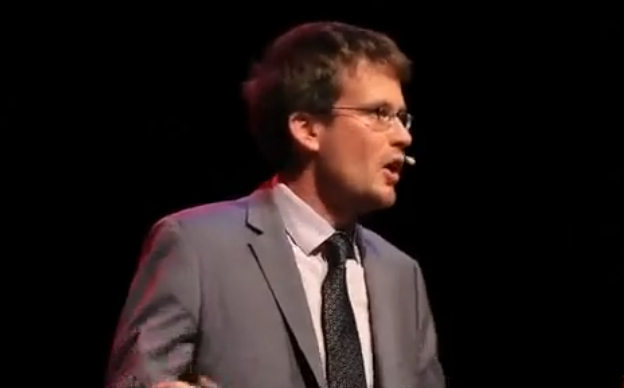It had a gas station, a general store, two houses at its peak.
那兒有一個加油站,一個百貨商店,山頂還有兩座房子。
And this is of course a completely irresistible metaphor to a novelist,
這對小說家而言具有非常重要的象征意義,
because we would all like to believe that the stuff that we write down on paper
因為我們都愿意相信我們寫下的東西
can change the actual world in which we're actually living,
能夠改變我們生活的這個世界,
which is why my third book is called "Paper Towns".
所以我將我的第三本小說命名為《紙鎮》。
But what interests me ultimately more than the medium in which this happened, is the phenomenon itself.
但其實讓我更感興趣的并不是這件事是如何發生的,而是這種現象本身。
It's easy enough to say that the world shapes our maps of the world, right?
大家很容易會想到,世界地圖是由世界的形狀決定的,對嗎?

Like the overall shape of the world is obviously going to affect our maps.
也就是說世界是什么樣,我們的地圖就是什么樣。
But what I find a lot more interesting is the way that the manner in which we map the world changes the world.
但我發現更有意思的是,我們制作地圖的方式反過來也會改變世界的樣子。
Because the world would truly be a different place if North were down.
因為我們(印象中)的世界將會是另一個樣子,如果(地圖的)下方是北。
And the world would be a truly different place if Alaska and Russia weren't on opposite sides of the map.
我們(印象中)的世界將會是另一個樣子,如果我們不把阿拉斯加和俄羅斯放在一起,隔海相望。
And the world would be a different place if we projected Europe to show it in its actual size.
我們(印象中)的世界將會是另一個樣子,如果我們按照歐洲的真實比例來制作地圖的話。
The world is changed by our maps of the world.
我們(制作)的世界地圖改變了世界。
The way that we choose -- sort of, our personal cartographic enterprise,
而我們選擇的(人生)道路--就好比我們私人的地圖制作公司,
also shapes the map of our lives, and that in turn shapes our lives.
繪制了我們人生的地圖,它反過來會影響我們的人生。











